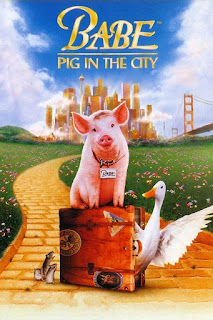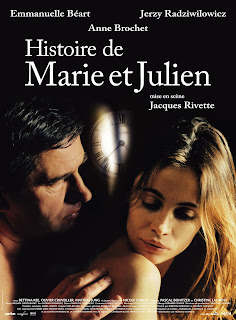October 6th: MACBETH (Orson Welles, 1948)
NOTE: This film will be projected in the high-definition Blu-ray format.
A Scottish general, seduced by a witch's prophecy of power and prodded into action by his wife, resorts to murder and struggles with the ramifications.
Orson Welles went from toast-of-the-town in Hollywood to chastened upstart in just a few short years, the amount of artistic freedom and control he had on his debut Citizen Kane taken away by studio heads who had tampered drastically by each of his subsequent works. Despite sound being available in film for over 15 years, only three Shakespeare adaptations had been released by the studios, and following the success of Laurence Olivier's British-made Henry V, Welles took it upon himself to usher in a new wave in 1947.
Welles had previously staged a wildly-successful theatrical version of Macbeth ten years earlier as part of President Franklin D. Roosevelt's Federal Theatre Project, specifically with the Negro Theatre Unit in Harlem. In keeping with his all-black cast, Welles changed the setting of the play from Scotland to Haiti, and referenced voodoo for the scenes involving the witches. While the film version would return the story to its Scottish roots, some of the ideas and elements from the stage production would remain.
The project found a home at Republic Pictures, attempting to move from making westerns to more prestigious films. Welles was limited to a $700,000 budget, agreeing to cover any overages himself. He was forced to re-use old western sets and pre-existing costumes, though the work on the latter was heavily researched. The shooting schedule was for only 23 days, including retakes.
Along with Welles in the title role, the cast included previous collaborators from his Mercury Theatre days, Jeanette Nolan, Erskine Sandford, and William Alland (the latter two having appeared in Citizen Kane). Irish actor Dan O'Herlihy and former child star Roddy McDowell (Planet Of The Apes) also feature. In order to speed up the shooting, Welles had all the dialogue pre-recorded for the actors to lip-synch to on camera, a short run of public performances at a Salt Lake City theatre serving as rehearsals.
Drastic changes were made to the original text, with characters excised and new ones added, scenes and lines moved around, and off-stage action portrayed on-screen. As with his other Shakespeare adaptions, Welles was more interested in capturing the spirit of the work as opposed to any faithfulness to it. He also wanted to portray a battle between the old pagan religions and Christianity.
After impressively completing photography on schedule and budget, Welles recklessly departed for Europe in search of more work, intending to supervise the editing process abroad. By the time Welles managed to complete his cut, it faced stiff competition from Laurence Olivier's film of Hamlet. A series of poorly-received previews forced the studio to delay Macbeth's wide release.
The studio talked Welles into making a series of cuts to the running time, as well as re-recording the dialogue without the thick Scottish accents the director had instructed his actors to use. When the film was finally re-released, it opened to moderate reviews (considerably more favorable in Europe outside the UK), and managed to earn a small profit. In 1980, the UCLA Film and Television Archive helped to locate and restore Welles' original version.
Running time is approx. 1 hr, 45 min.
A Scottish general, seduced by a witch's prophecy of power and prodded into action by his wife, resorts to murder and struggles with the ramifications.
Orson Welles went from toast-of-the-town in Hollywood to chastened upstart in just a few short years, the amount of artistic freedom and control he had on his debut Citizen Kane taken away by studio heads who had tampered drastically by each of his subsequent works. Despite sound being available in film for over 15 years, only three Shakespeare adaptations had been released by the studios, and following the success of Laurence Olivier's British-made Henry V, Welles took it upon himself to usher in a new wave in 1947.
Welles had previously staged a wildly-successful theatrical version of Macbeth ten years earlier as part of President Franklin D. Roosevelt's Federal Theatre Project, specifically with the Negro Theatre Unit in Harlem. In keeping with his all-black cast, Welles changed the setting of the play from Scotland to Haiti, and referenced voodoo for the scenes involving the witches. While the film version would return the story to its Scottish roots, some of the ideas and elements from the stage production would remain.
The project found a home at Republic Pictures, attempting to move from making westerns to more prestigious films. Welles was limited to a $700,000 budget, agreeing to cover any overages himself. He was forced to re-use old western sets and pre-existing costumes, though the work on the latter was heavily researched. The shooting schedule was for only 23 days, including retakes.
Along with Welles in the title role, the cast included previous collaborators from his Mercury Theatre days, Jeanette Nolan, Erskine Sandford, and William Alland (the latter two having appeared in Citizen Kane). Irish actor Dan O'Herlihy and former child star Roddy McDowell (Planet Of The Apes) also feature. In order to speed up the shooting, Welles had all the dialogue pre-recorded for the actors to lip-synch to on camera, a short run of public performances at a Salt Lake City theatre serving as rehearsals.
Drastic changes were made to the original text, with characters excised and new ones added, scenes and lines moved around, and off-stage action portrayed on-screen. As with his other Shakespeare adaptions, Welles was more interested in capturing the spirit of the work as opposed to any faithfulness to it. He also wanted to portray a battle between the old pagan religions and Christianity.
After impressively completing photography on schedule and budget, Welles recklessly departed for Europe in search of more work, intending to supervise the editing process abroad. By the time Welles managed to complete his cut, it faced stiff competition from Laurence Olivier's film of Hamlet. A series of poorly-received previews forced the studio to delay Macbeth's wide release.
The studio talked Welles into making a series of cuts to the running time, as well as re-recording the dialogue without the thick Scottish accents the director had instructed his actors to use. When the film was finally re-released, it opened to moderate reviews (considerably more favorable in Europe outside the UK), and managed to earn a small profit. In 1980, the UCLA Film and Television Archive helped to locate and restore Welles' original version.
Running time is approx. 1 hr, 45 min.











Comments
Post a Comment